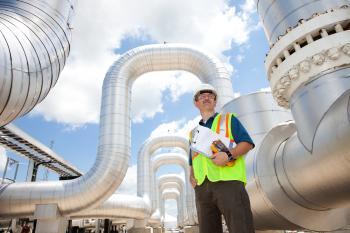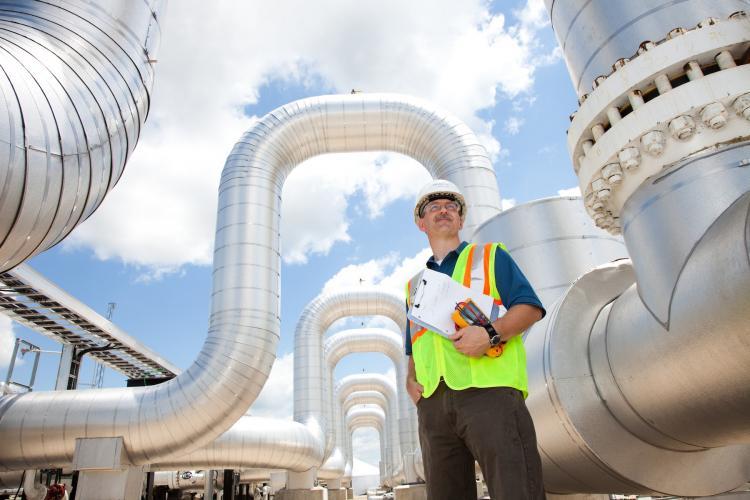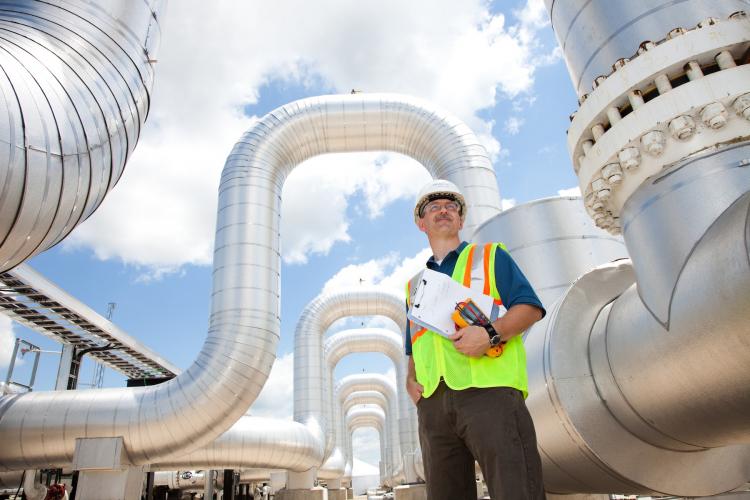EDMONTON, Canada—Worried that TransCanada’s cross-border crude oil pipeline expansion project will soon be given the green light, U.S. lawmakers are pushing for a further environmental assessment.
Twenty-eight U.S. members of Congress signed a letter to Secretary of State Hillary Clinton expressing concern that the Department of State’s (DOS) assessment of the environmental impact of the pipeline is inadequate.
“Not only does tar sands oil have a higher lifecycle for greenhouse gas emissions, but it also has an environmentally destructive extraction process and environmentally precarious transpiration system,” reads the letter.
The members of Congress asked the DOS to conduct a supplemental environmental impact statement and expressed their discontent with Clinton’s recent comments that the DOS is “inclined to approve” the project.
The Keystone XL project involves construction of a 1,677-mile pipeline to transport crude oil from Alberta, Canada to U.S. refineries all the way to the Gulf Coast, crossing six U.S. states.
The project is an expansion of the Keystone Pipeline that began operation this year, transporting crude oil from Alberta to U.S. Midwest refineries. The expansion is slated to increase the capacity of the pipeline system to 1.1 million barrels per day.
The project has also come under heavy criticism for its planned route through the Ogalla aquifer in Nebraska, one of the world’s largest aquifers.
With memories of the BP Gulf of Mexico oil spill and the major leak from the Enbridge oil pipeline into a Southern Michigan river still fresh, opponents fear potential leaks would contaminate the aquifer.
A similar letter to Clinton was issued by 50 members of the House of Representatives in June, saying that a complete environmental impact statement should be taken into consideration when evaluating whether the project is in the national interest.
Concerns were also raised by 11 U.S. senators in a letter sent to Clinton in October asking for a thorough and transparent review of the project.
A presidential permit for the project was expected this fall but was delayed until further environmental evaluations are performed.
Terry Cunha, a spokesperson with Calgary-based TransCanada, says the company is expecting to receive the permit in the first half of 2011.
A statement on TransCanada’s website reads that the $12 billion pipeline system “will play an important role in linking a secure and growing supply of Canadian crude oil with the largest refining markets in the United States, significantly improving North American security supply.”
Greg Stringham, vice president of the Canadian Association of Petroleum Producers, says the United States sees major benefits in Canadian oil from an “energy security” perspective.
U.S. refineries in the Gulf Coast have historically been processing oil from Mexico, whose fields have now gone into natural decline, and from Venezuela, which has chosen to move its oil “politically” out of the United States, making Canada, the friendly neighbor to the North, the supplier of choice, Stringham says.
“They really do value Canada as being a friendly, reliable supplier and trading partner,” he says.
Last month, U.S. Congressman Fred Upton, a senior member of the House Energy and Commerce Committee, wrote a letter to Clinton expressing his support for the Keystone expansion project.
“We must end our dependence on foreign oil from regimes that are hostile to the United States. This pipeline will supply approximately 50 percent of the oil that the United States currently imports from Venezuela or the Middle East,” he wrote.
Montana Gov. Brian Schweitzer made similar remarks when responding to concerns raised by movie director James Cameron about the environmental footprint of the oil sands operations during his trip to Alberta in September. Schweitzer defended Canadian oil as safe and “conflict free,” according to the Canadian Press.
“Most places around the world that are oil exporters have some of the most brutal regimes, their people have the fewest civil liberties, and the individual citizens gain no particular wealth from the oil,” he said.
A study by the U.S.-based Energy Policy Research Foundation says that the pipeline expansion project will provide a net benefit of $100 million to $600 million a year for the United States, as well as a boost in construction employment.
Ottawa endorsed the Keystone project and is trying to lobby the U.S. administration to allow the expansion.
“The Keystone XL Pipeline project will help meet the U.S. demand for the safe, secure, and environmentally responsible delivery of oil,” Jacinthe Perras, a spokesperson with Natural Resources Canada, wrote in an e-mail.
“Canada and the U.S. are each other’s most important energy partner. We trade oil, natural gas, and electricity across our shared border every day,” Perras said.
The project has faced criticism on the Canadian side of the border as well by trade unions and the provincial and federal NDP. Their stance is that the focus should be on increasing refining capacity in Canada rather than transporting the crude oil to the United States to be refined, thereby losing Canadian jobs.
Stringham says the amount of crude oil exported from Canada is consumer-driven and provides opportunities for Canadian industry to maximize value in production.
The National Energy Board, a Canadian federal agency, approved the Keystone XL project last March, saying the proposed pipeline will provide a “long-term and strategic market for Western Canadian crude oil” and bring economic and other benefits for Canada.
Twenty-eight U.S. members of Congress signed a letter to Secretary of State Hillary Clinton expressing concern that the Department of State’s (DOS) assessment of the environmental impact of the pipeline is inadequate.
“Not only does tar sands oil have a higher lifecycle for greenhouse gas emissions, but it also has an environmentally destructive extraction process and environmentally precarious transpiration system,” reads the letter.
The members of Congress asked the DOS to conduct a supplemental environmental impact statement and expressed their discontent with Clinton’s recent comments that the DOS is “inclined to approve” the project.
The Keystone XL project involves construction of a 1,677-mile pipeline to transport crude oil from Alberta, Canada to U.S. refineries all the way to the Gulf Coast, crossing six U.S. states.
The project is an expansion of the Keystone Pipeline that began operation this year, transporting crude oil from Alberta to U.S. Midwest refineries. The expansion is slated to increase the capacity of the pipeline system to 1.1 million barrels per day.
The project has also come under heavy criticism for its planned route through the Ogalla aquifer in Nebraska, one of the world’s largest aquifers.
With memories of the BP Gulf of Mexico oil spill and the major leak from the Enbridge oil pipeline into a Southern Michigan river still fresh, opponents fear potential leaks would contaminate the aquifer.
A similar letter to Clinton was issued by 50 members of the House of Representatives in June, saying that a complete environmental impact statement should be taken into consideration when evaluating whether the project is in the national interest.
Concerns were also raised by 11 U.S. senators in a letter sent to Clinton in October asking for a thorough and transparent review of the project.
A presidential permit for the project was expected this fall but was delayed until further environmental evaluations are performed.
Terry Cunha, a spokesperson with Calgary-based TransCanada, says the company is expecting to receive the permit in the first half of 2011.
Secure Supply
A statement on TransCanada’s website reads that the $12 billion pipeline system “will play an important role in linking a secure and growing supply of Canadian crude oil with the largest refining markets in the United States, significantly improving North American security supply.”
Greg Stringham, vice president of the Canadian Association of Petroleum Producers, says the United States sees major benefits in Canadian oil from an “energy security” perspective.
U.S. refineries in the Gulf Coast have historically been processing oil from Mexico, whose fields have now gone into natural decline, and from Venezuela, which has chosen to move its oil “politically” out of the United States, making Canada, the friendly neighbor to the North, the supplier of choice, Stringham says.
“They really do value Canada as being a friendly, reliable supplier and trading partner,” he says.
Last month, U.S. Congressman Fred Upton, a senior member of the House Energy and Commerce Committee, wrote a letter to Clinton expressing his support for the Keystone expansion project.
“We must end our dependence on foreign oil from regimes that are hostile to the United States. This pipeline will supply approximately 50 percent of the oil that the United States currently imports from Venezuela or the Middle East,” he wrote.
Montana Gov. Brian Schweitzer made similar remarks when responding to concerns raised by movie director James Cameron about the environmental footprint of the oil sands operations during his trip to Alberta in September. Schweitzer defended Canadian oil as safe and “conflict free,” according to the Canadian Press.
“Most places around the world that are oil exporters have some of the most brutal regimes, their people have the fewest civil liberties, and the individual citizens gain no particular wealth from the oil,” he said.
A study by the U.S.-based Energy Policy Research Foundation says that the pipeline expansion project will provide a net benefit of $100 million to $600 million a year for the United States, as well as a boost in construction employment.
Ottawa endorsed the Keystone project and is trying to lobby the U.S. administration to allow the expansion.
“The Keystone XL Pipeline project will help meet the U.S. demand for the safe, secure, and environmentally responsible delivery of oil,” Jacinthe Perras, a spokesperson with Natural Resources Canada, wrote in an e-mail.
“Canada and the U.S. are each other’s most important energy partner. We trade oil, natural gas, and electricity across our shared border every day,” Perras said.
The project has faced criticism on the Canadian side of the border as well by trade unions and the provincial and federal NDP. Their stance is that the focus should be on increasing refining capacity in Canada rather than transporting the crude oil to the United States to be refined, thereby losing Canadian jobs.
Stringham says the amount of crude oil exported from Canada is consumer-driven and provides opportunities for Canadian industry to maximize value in production.
The National Energy Board, a Canadian federal agency, approved the Keystone XL project last March, saying the proposed pipeline will provide a “long-term and strategic market for Western Canadian crude oil” and bring economic and other benefits for Canada.







